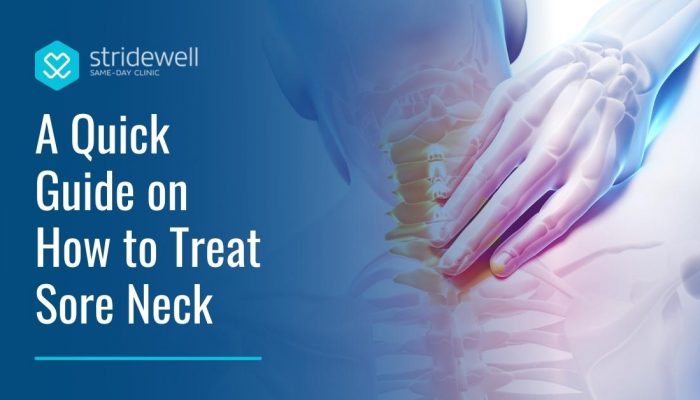It may be difficult to accomplish daily duties when you have a stiff neck due to the pain and limited range of motion. As a result of this illness, you may also get severe headaches, shoulder pain, or pain radiating down your arm.
Refer to the section below to learn more about how to treat a sore neck.
Ways to Treat Sore Neck
Stiff neck first aid techniques range from rest and light stretching to over-the-counter drugs, but a doctor’s visit may be necessary if symptoms linger for more than a week or are accompanied by other worrying symptoms. With stretches, over-the-counter pain medicines, and heat or ice, as well as appropriate posture while using a computer or phone, you can alleviate neck stiffness.
Self-Care for a Sore Neck
An individual can do several things on their own to begin treating a stiff neck. Some common self-care strategies include:
Rest
If your neck hurts because of tension or strain, rest is one of the quickest and simplest ways to alleviate the discomfort. This allows your muscles, joints, and ligaments a chance to heal on their own.
Cold and heat therapy
Cold therapy or ice packs can alleviate most neck stiffness by reducing local inflammation. Applying ice to the affected area during the first 24 to 48 hours following a major flare-up is the most efficient strategy to reduce inflammation. Increasing blood flow to the neck with heat can accelerate the healing process. Certain patients enjoy the heat, while others prefer cold. Alternatively, you may use either of the two.
Over-the-counter medications
A common first-line treatment for neck stiffness and discomfort is nonsteroidal anti-inflammatory medications (NSAIDs), which work by lowering inflammation. Advil, Motrin, and other ibuprofen- and naproxen-based NSAIDs are the most often prescribed NSAIDs in the United States (e.g., Naprosyn). It is essential to talk to a pharmacist or doctor before taking any medication, even if it is a nonprescription product that has no prescription.
Gentle stretching
Stretching helps ease the stiffness and restore the neck to a more natural range of motion.
The following are some examples of gentle stretching you may do to alleviate your sore neck:
- Neck extension (backward bending)
- Neck flexion (forward bending)
- Lateral neck flexion (bending side to side)
- Neck rotation (turning side to side)
A sore neck that is uncomfortable and difficult to move may only require one attempt at each of these stretches. You can do these stretches again in a few hours or even the next day.
Holding the stretch positions for 10 seconds or performing many sets of the same stretch at once might lengthen these stretches. Maintaining a focus on improving neck flexibility and function, not discomfort, is the most important thing you can do.
Neck strengthening and stretching can be continued even after the initial pain and stiffness have been alleviated to reduce the likelihood of the discomfort returning. A physical therapist or other skilled health professionals can assist many people in learning proper stretches.
Low-impact aerobic exercise
Before beginning any exercise program, have an appointment with your doctor to ensure that you don’t put your neck in any danger of harm.
You can improve your flexibility with a combination of stretching and low-impact cardiovascular activity, such as walking. Even though walking doesn’t directly affect the neck, it helps circulate oxygen throughout the spine, promoting healing.
If the strain or sprain is severe, alternative treatments may be more effective for some people than others. Most people have to go through a lot of trial and error before finding a therapy strategy that works for them.
Exercising your neck without straining it isn’t easy to come by. Choices that are sure to stand the test of time are wise ones. If used properly, the treadmill, stationary cycle, elliptical, and stair climber all provide lower-body exercises that won’t exacerbate a neck condition.
Depending on the style, routines, and intensity of the class, as well as your specific ailment, low-impact group aerobics classes may potentially be appropriate.
When to seek professional help
After a few days, neck pain caused by muscle tension or strain usually goes away on its own and does not necessitate any additional treatment. Exercise, stretching, physical therapy, massage, and observation are generally effective in treating chronic neck discomfort, although some cases may require steroid injections or even surgery in some circumstances.
You should consult a doctor if a stiff neck does not lighten up within a week. In addition, a stiff neck that is accompanied by any red flag symptoms—such as fever, headache, nausea or vomiting, or unexplained sleepiness—should be assessed by a medical professional as soon as possible.
Neck discomfort is diagnosed by a physician based on a general evaluation and medical history. Your doctor will feel and move your neck to pinpoint areas of pain and mobility abnormalities. Additionally, doctors assess your muscle strength and reflexes. Your physician will inquire about any prior neck injuries that may have resulted in whiplash or a herniated disc. Your doctor may inquire about your job or other activities that may cause discomfort in your neck.
Your doctor may order imaging tests such as X-rays, magnetic resonance imaging (MRI), or computed tomography to determine the source of the discomfort (CT). These examinations may reveal injury and other abnormalities in the neck’s bones and surrounding tissues.
Contact Stridewell to learn more about how to treat a sore neck
Neck pain can be challenging to manage, but self-care is a viable option for most people with neck pain before seeking medical attention.
If your neck pain makes it hard to sit still or you’ve been experiencing severe headaches and dizziness, call a pain management clinic like Stridewell right away. We provide the best care possible to get our patients back on their feet as soon as possible. You may also want to consult us if you have any questions about how we treat sore neck.
read article


